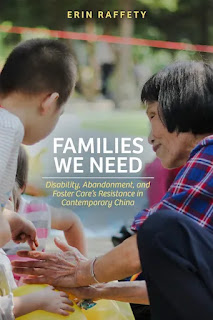 Princeton Writing Program where she teaches on disability justice.
Princeton Writing Program where she teaches on disability justice.
At Princeton Theological Seminary, Raffety serves as the Senior Researcher on the Isaiah Partnership (a study of pastors leading innovation for theological education), the Empirical Research Consultant on the Imagining Church Project (a nationwide study of thriving congregations) and the Associate Research Scholar for the Institute for Youth Ministry. She is also a Research Fellow at the Center of Theological Inquiry, where she is conducting a study on worship access for Christians living with Long COVID and chronic illness.
Raffety is also the author of two books, one on disability ministry in the United States, From Inclusion to Justice (2022), and the other on foster care in China, Families We Need (2022). She is ordained as a Teaching Elder in the PC(USA), holds a Ph.D. in Cultural Anthropology from Princeton University, and is a proud parent of a daughter with multiple disabilities.
Raffety applied the “Page 99 Test” to Families We Need and reported the following:
At first I did not want to like Huilan or the other orphanage monitors and INGO workers I met in Southwest China, because they seemed callous and were critical of the foster mothers I was so eager to understand. But on page 99 Huilan reveals to me that behind this bureaucratic exterior is a young woman who is torn between families.Follow Erin Raffety on Twitter and visit her website.
At the top of the page, Huilan brims with pride as she watches foster children, placed from the state orphanage into private foster homes with mostly older retirees, thrive in their new village, but she also expresses guilt about spending so much time building and nurturing emotional relationships that are not her own. “I was there when [these foster children] were abandoned into the orphanage,” she tells me.“When they lived there, I was there everyday; when they cried, when they laughed, I watched them grow. And when they go into foster homes, I can’t believe how well they’re doing. And I’m so happy…” Her voice trailed off. “But they also get to spend so much time together—these old men and women, they can be with their children all day. And I’m with them, while my husband, my in-laws, and my daughter are back at home.”I remember that in this moment in the hotel room, literally naked under our towels, my simplistic judgments about foster care monitors like Huilan were exposed to me. That moment softened me, because Huilan let me into her inner life, yet I struggled to comfort her. It made me a better fieldworker because it made me realize that in order to understand Chinese foster families, I needed to understand the other families with which they were emotionally intertwined.
On page 99, I come to a critical conclusion about this emotional tension: “I realized that underneath some of the disparaging comments foster care monitors like Huilan made about foster mothers or their seemingly manipulative efforts to reform them lay a deep-seated envy and a personal longing for this emotional intimacy they so vicariously and eagerly sought to effect in foster families. Underneath the seeming austerity of policing contractual relationships that struggled to elevate lower-class women to upper-class parenting practices lay a murky, emotionally fraught ambivalence that left middle-class women struggling to build family relationships within a societal contact in which the roles were constantly shifting under their feet.”
This insight about envy was critical to the overall argument of the book that shows families to be “porous and permeable” (also page 99!), even though in modernity we obscure and elevate some families as permanent, autonomous, and independent. Page 99 shows how fieldwork is also permeable, porous, and emotional. On page 99 my emotional guard comes down, and it is a turning point for apprehending the emotional complexity in family making that the book strives to illuminate.
--Marshal Zeringue



